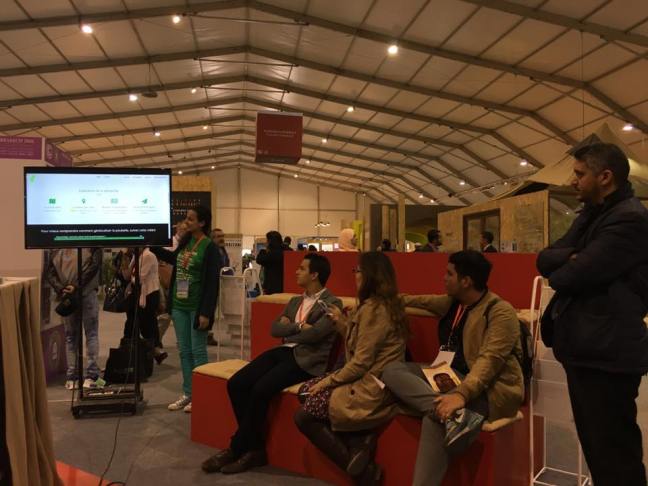Our own Souad Kadi, a Project Manager in our Agadir office, recently spent a month with the American Association of University Women in Washington, D.C. as part of a Fellowship program. Dar Si Hmad is proud to support personal and professional growth for our staff - and proud of Souad for being such a strong advocate and role model for young women in Morocco!
Check out the original post at http://www.aauw.org/2016/12/20/empowering-moroccan-women/

Here’s what Kadi had to say about her time at AAUW.
Women face numerous challenges in Moroccan society. The issue of gender inequality is still acute — Morocco ranked 139th out of 145 countries included in the 2015 Global Gender Gap Report published by the World Economic Forum — and lack of educational access for girls is one of the biggest obstacles in the way of bridging Morocco’s gender gap.
I am one of the very few young women from my home village to complete
a university degree; many older women from my village are uneducated,
and the vast majority of my female peers dropped out of school before
starting higher education. The ratio of young educated females to males
remains low in Morocco, and the number of women participating in the formal labor force is also below average compared to other countries. Additionally, there are still laws with provisions that work against progress toward gender equality and blatantly give men the upper hand in familial, social, political, and economic matters.
However, some progress for women’s empowerment is being made. More
Moroccan civil society leaders are working closely with communities to
address issues of gender inequality. The nonprofit organization I work
for, Dar Si Hmad
(DSH), is committed to enhancing quality educational opportunities and
sustainable livelihoods for vulnerable populations, especially women and
girls in Morocco. DSH helps women and girls in rural areas through
their fogwater harvesting project, capacity-building trainings, and Water School.
The fogwater harvesting system pioneers technology
to harvest water from fog and deliver it to marginalized rural
communities in Aït Baamrane in southwest Morocco. The system has been
successful, reaching approximately 400 individuals, 300 of whom are
women. In the past, women from these rural communities would spend
approximately four hours each day collecting and transporting water to
their homes. Now, thanks to the fogwater harvesting system, women have
more free time to dedicate to pursuing education and meaningful
employment. These same women also participate in DSH’s new weekly
trainings, which teach functional literacy and educate women about
income-generating projects.
DSH also implements an annual Water School to expose both girls and boys from rural communities to science, technology, engineering, and math (STEM) fields. By including girls in the curriculum and exposing them to STEM fields (as recommended in AAUW research), DSH’s Water School is actively taking steps to dismantle persistent sexist stereotypes that devalue Moroccan girls by deeming them less intellectually capable than boys. Approximately 120 girls have participated in the Water School project over the last three years.
I am proud of the impact I have been able to make on women’s empowerment work in Morocco through DSH and I look forward to using what I have learned during my fellowship in the United States and my time at AAUW to strengthen future DSH projects and continue the work of bridging the gender equality gap for young Moroccan girls and women.
Check out the original post at http://www.aauw.org/2016/12/20/empowering-moroccan-women/

AAUW hosted Souad Kadi for a month this fall as part of the Professional Fellows Program, implemented by Hands Along the Nile and funded by the U.S. Department of State. As part of her fellowship program, Kadi spent time learning about AAUW’s fundraising, programs, and advocacy. During her fellowship she received leadership and grant writing training, connected with area nonprofits working on women’s and girls’ empowerment in her home country of Morocco, met AAUW members, and visited the United Nations.“I look forward to using what I have learned during my fellowship in the United States and my time at AAUW to … continue the work of bridging the gender gap for young Moroccan girls and women.” — Souad Kadi
Here’s what Kadi had to say about her time at AAUW.
Women face numerous challenges in Moroccan society. The issue of gender inequality is still acute — Morocco ranked 139th out of 145 countries included in the 2015 Global Gender Gap Report published by the World Economic Forum — and lack of educational access for girls is one of the biggest obstacles in the way of bridging Morocco’s gender gap.
 |
| Souad visited the United Nations during her time with AAUW. |
 |
| Souad also visited the International Youth Foundation with AAUW staff and supporters during her fellowship |
 |
| Souad on her last day at AAUW with Program Associate Theon Gruber Ford |
DSH also implements an annual Water School to expose both girls and boys from rural communities to science, technology, engineering, and math (STEM) fields. By including girls in the curriculum and exposing them to STEM fields (as recommended in AAUW research), DSH’s Water School is actively taking steps to dismantle persistent sexist stereotypes that devalue Moroccan girls by deeming them less intellectually capable than boys. Approximately 120 girls have participated in the Water School project over the last three years.
I am proud of the impact I have been able to make on women’s empowerment work in Morocco through DSH and I look forward to using what I have learned during my fellowship in the United States and my time at AAUW to strengthen future DSH projects and continue the work of bridging the gender equality gap for young Moroccan girls and women.





